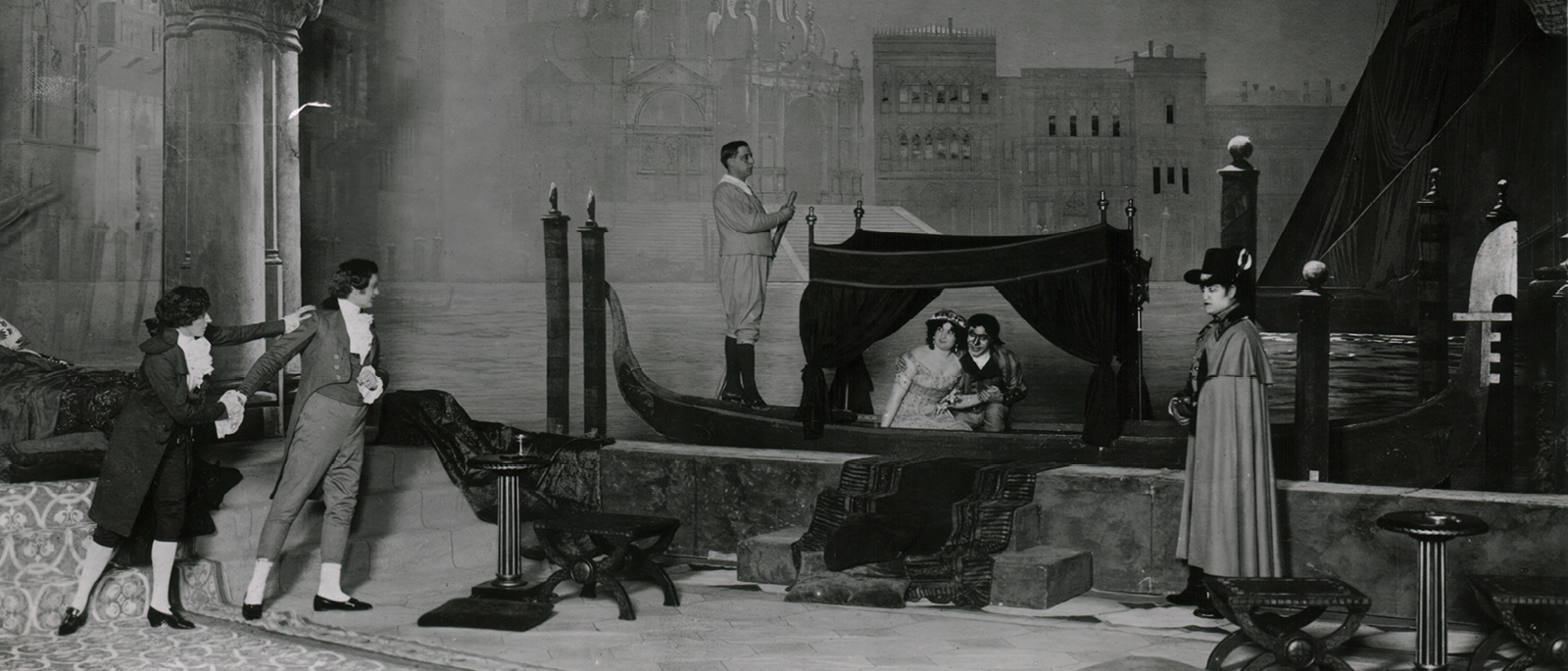
French Opera
Operas by French composers have appeared at the Met since the company opened its doors in 1883 with Gounod’s Faust, but they were often given in Italian, depending on the preferences of available casts. In addition, from 1906 to 1910, the Met had major competition from Oscar Hammerstein’s Manhattan Opera, which specialized in French opera and imported many of France’s leading artists. The Met finally staged Jacques Offenbach’s 1881 chef d’oeuvre, Les Contes d’Hoffmann, for the first time in 1913. While Offenbach’s output consisted mostly of operetta, Jules Massenet was a prolific composer of both grand and “comique” opera. Many Massenet works had Met premieres during the 1890s and served as popular vehicles for such adored divas as Nellie Melba, Emma Calvé, and Emma Eames and for the tenor idol of the period, Jean de Reszke. The Met premiere of Massenet’s Thaïs, however, had to wait for the demise of the Manhattan Opera, where the seductive title role had been a specialty of the legendary singing actress Mary Garden. Geraldine Farrar, no less an interpreter of femmes fatales than Garden, brought Thaïs to life for the Met premiere. Operas by other French composers such as Paul Dukas, Alfred Bruneau, and Charles Lecocq also had premieres at the Met during this period but did not find a permanent foothold in the repertory.
Offenbach’s Les Contes d’Hoffmann
Left: French Algerian baritone Dinh Gilly sang Dappertutto at the Met premiere of Les Contes d’Hoffmann in 1913. The following year, Gilly’s promising singing career was cut short when the Austrians interned him as a French national during World War I.
Photo: Herman Mishkin
Right: Frieda Hempel sang the role of the doll Olympia at the company premiere of Les Contes d’Hoffmann “with great skill and brilliancy” (The New York Times). The German soprano was the Met’s leading coloratura for a decade following the retirements of Nellie Melba and Marcella Sembrich and before the debut of Amelita Galli-Curci.
Left: Costume sketch for Olympia by Attilio Comelli, 1913 production of Les Contes d’Hoffmann.
Right: Costume sketch for Hoffmann by Attilio Comelli, 1913 production of Les Contes d’Hoffmann.
Right: Shown left to right in Act III of Les Contes d’Hoffmann in the premiere production: Tenor Albert Reiss as Frantz, tenor Umberto Macnez as Hoffmann, soprano Lucrezia Bori as Antonia, bass Leon Rothier as Dr. Miracle, and bass Giulio Rossi as Crespel.
Photo: white studio
Left: The New York Times review began “The laudable attempt of the management of the Metropolitan Opera House to vary and enlarge its repertory … resulted in the production of Jacques Offenbach’s fantastic opera, Les Contes d’Hoffmann.” Shown above in Act II (left to right) are mezzo-soprano Jeanne Maubourg as Nicklausse, tenor Umberto Macnez as Hoffmann, contralto Maria Duchène as Giulietta (Olive Fremstad sang the premiere), tenor Angelo Badà as Pitichinaccio, and baritone Dinh Gilly as Dappertutto.
Photo: white studio
Left: German-born Jacques Offenbach made his career in Paris composing delightfully satirical operettas that earned him the nickname “Mozart of the boulevards.” Though his operettas often parodied grand opera, Offenbach longed to have his works performed in opera houses. To date, only Les Contes d’Hoffmann and his operetta La Périchole have been presented at the Met.
Photo: Nadar
Right: Conductor Giorgio Polacco made his Met debut in 1912, but when Toscanini left the company in 1915, he became the principal conductor for Italian and French repertory. In 1917, Polacco departed to lead the Chicago Opera.
Photo: Herman Mishkin
Massenet’s Thaïs
Soprano Geraldine Farrar sang the title role of Thaïs opposite baritone Pasquale Amato as Athanaël in the Met premiere of Massenet’s operatic story of a courtesan who undergoes a spiritual transformation. Farrar’s popularity among Met stars was second only to that of tenor Enrico Caruso. Her stylish looks won her a fan club of young women imitators known as “Gerry-flappers.”
Photo: White Studio
Right: Act II of Thaïs from the Met’s second production in 1922, set design by Joseph Urban.
Photo: White Studio
Left: Jules Massenet was France’s leading opera composer of the late 19th and early 20th century. Four of his works had premiered at the Met before 1900, and his melodic, romantic style appealed particularly to singers and audiences. Four more operas by Massenet have been performed by the Met since the 1917 Thaïs premiere, the most recent being Cendrillon in 2018.
Photo: Franz Hanfstaengl
New Opera at the Met: Then and Now
French Opera